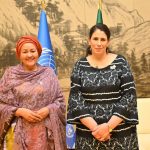MINILS D-G backs LG autonomy for sustainable development
Emmanuel kehinde,Ilorin
The Director-General of Michael Imoudu National Institute for Labour Studies (MINILS),Mr Issa Aremu, on Tuesday in Ilorin, expressed support for Local Government autonomy across Nigeria.
Aremu gave the support during the opening of a two-day in-plant workshop organised by MINILS for the Nigeria Union of Local Government Employees (NULGE), Osun State chapter at the Institute.
The theme of the Workshop is entitled: “Sustainable Industrial Relations Harmony and Productivity Enhancement: an Imperative for Local Government Development”.
He commended members of NULGE for their consistent struggle for local government autonomy.
The D-G urged Nigerians to appreciate the country’s 24 years of uninterrupted democracy, while arguing that local governments should be regarded as the first tier of government due to the special roles they play at the grassroots.
According to him, the demand by NULGE for increment in salary has become necessary as that will help their members meet up with the economic realities in the country.
He further advocated for sustainable palliative programmes which should strictly be anchored by local government administration to complement the efforts of the Federal Government in mitigating the impact of the fuel subsidy removal on wage income and public welfare.
While making a case for local governments to be returned to their original status, he advised that 10 per cent of the Internally Generated Revenue (IGR) meant for them be paid as at when due.
He commended the organised labour and other stakeholders for engaging the Federal government through social dialogue.
Also speaking, Alhaji Ambali Hakeem, the National President of the NULGE advised Government to revisit the issue of LG Autonomy in the country for better service delivery at the grassroots
He further suggested that the Nigerian Government should cut down the size of governance, as Nigeria can not continue to go on with a retinue of aides, convoy of vehicles of 15 to 100.
Hakeem advised that the money realized from such could be reinvested in the education sector and make primary to secondary education free while tertiary education would be subsidized.
According to him, the government must also look at the area of providing some Agricultural equipment and fertilizers at a subsidised rate for the farmers and as well provide local security so that farmers will be able to go back to the farm and thereby provide food for Nigerian people.
Similarly, he advocated that the government needs to look at the bank interest rate as a matter of emergency and instruct banks to grant loans to SMEs at single-digit interest rates and to farmers’ cooperative societies.
He observed that this will enable them to have direct access to reduced interest rate loans.












